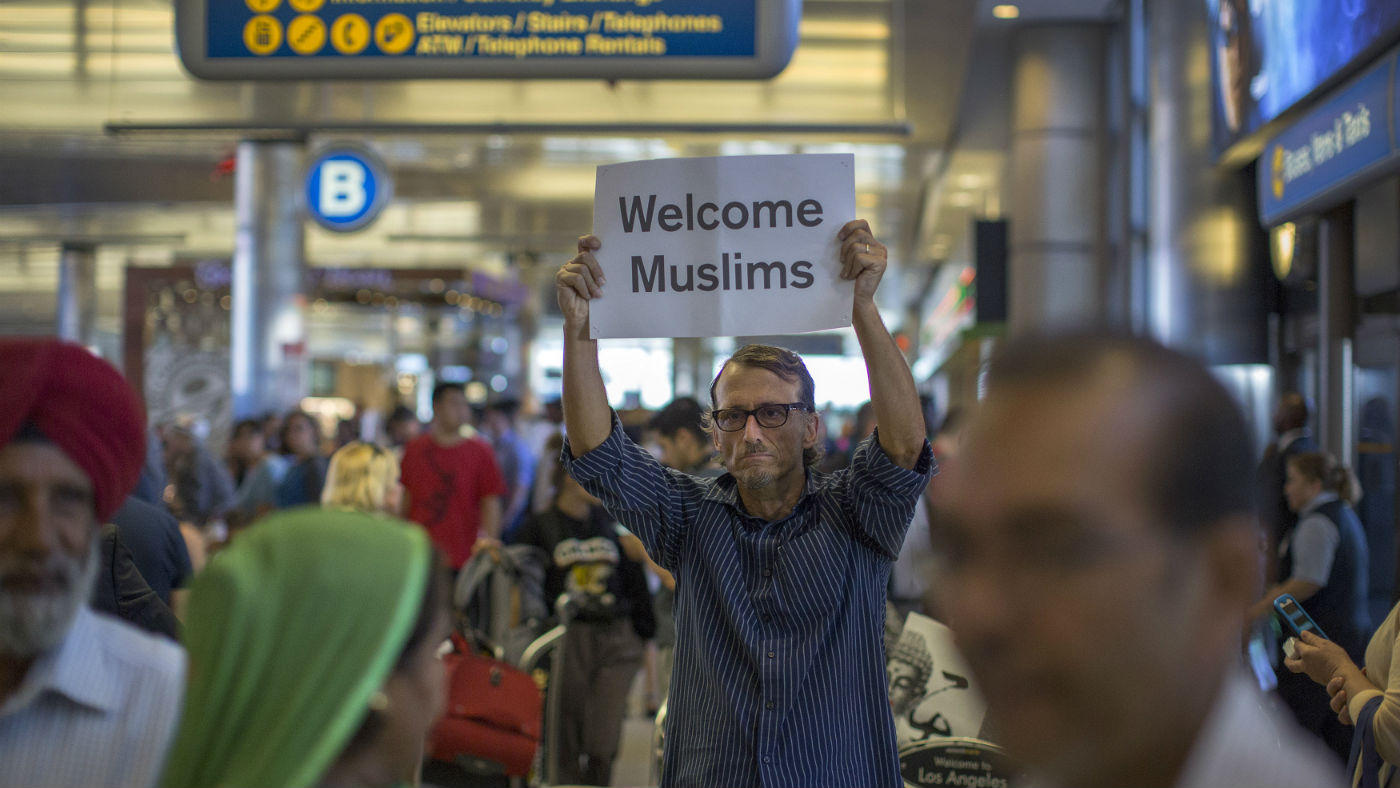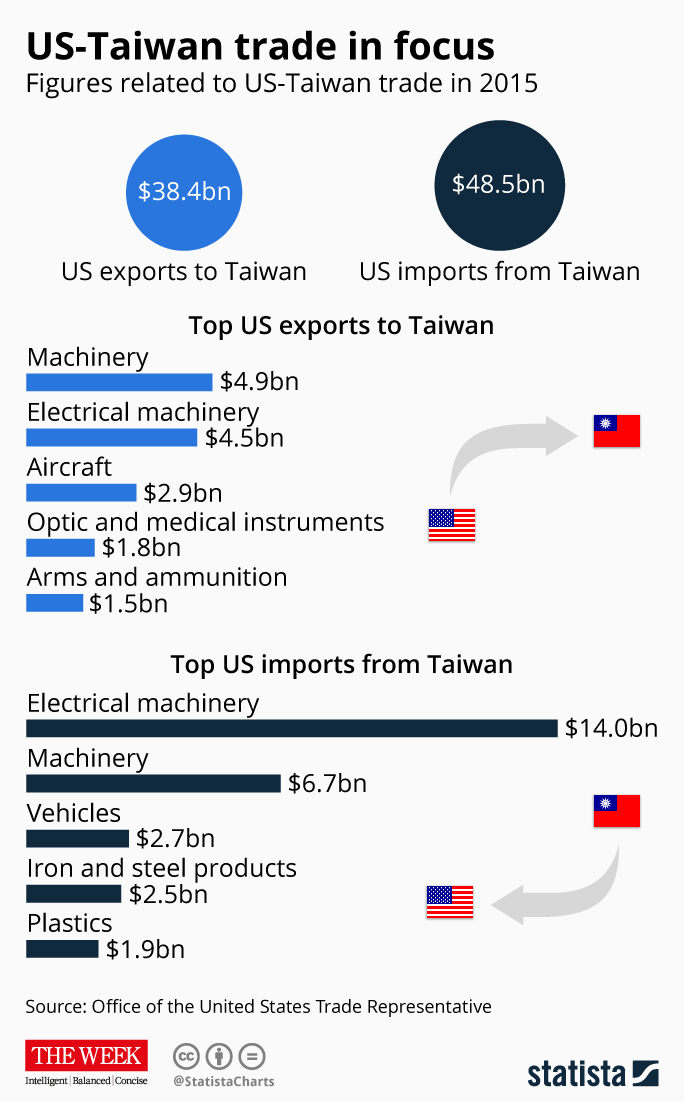Trump travel ban: Judge expands definition of relatives
Grandparents and other family members to be allowed entry to US

A free daily email with the biggest news stories of the day – and the best features from TheWeek.com
You are now subscribed
Your newsletter sign-up was successful
Donald Trump 'bears no sense of how to run a superpower'
19 December
Chinese state-owned newspaper the Global Times has openly criticised president-elect Donald Trump, focusing on a series of his recent tweets in which the paper said he "seemed emotionally upset".
In a highly critical article, the paper said "Trump is not behaving as a president who will become master of the White House in a month", adding: "He bears no sense of how to lead a superpower."
The Week
Escape your echo chamber. Get the facts behind the news, plus analysis from multiple perspectives.

Sign up for The Week's Free Newsletters
From our morning news briefing to a weekly Good News Newsletter, get the best of The Week delivered directly to your inbox.
From our morning news briefing to a weekly Good News Newsletter, get the best of The Week delivered directly to your inbox.
Over the weekend, Trump posted a series of tweets that raised concern among Chinese media outlets. His first, on Saturday, said: "China steals United States Navy research drone in international waters - rips it out of water and takes it to China in unpresidented [sic] act." The tweet was deleted shortly afterwards and reposted with the correct spelling of "unprecedented".
The following day, Trump tweeted: "We should tell China that we don't want the drone they stole back. - let them keep it!"
Commenting on the bullish language used in the tweets, the Global Times questioned whether Trump "is engaged in a psychological war with China", or if he was "just unprofessional". The paper said that "even the US military did not use the term 'steal' to describe the move by the Chinese navy" and that people were worried that he will "treat China-US relations as child's play"
The Global Times, which The Guardian describes as a "fervently nationalist" publication that "sometimes reflects official thinking", went on to give a thinly veiled warning to the incoming Trump administration.
A free daily email with the biggest news stories of the day – and the best features from TheWeek.com
"If [Trump] treats China after assuming office in the same way as in his tweets, China will not exercise restraint," the paper said. "We should show Trump what the one-China policy is and what bottom lines in Sino-US ties he should not touch. Once he does, he is bound to suffer the same losses that he makes China suffer from."
Trump provoked the ire of the Chinese government earlier this month when he received a ten-minute phone call from the President of Taiwan, Tsai Ing-wen. This made Trump the first US leader or leader-in-waiting to speak to Taiwan's president since 1979, as the US officially cut diplomatic relations with Taiwan to maintain stronger ties with China.
In a tweet shortly after the call, Trump confirmed that he had spoken to Tsai Ing-Wen, referring to her as the "President of Taiwan". This further breaks US government protocol, in which the president of Taiwan is referred to as the "leader" or even "President on Taiwan", says the Daily Telegraph.
Briton Michael Sandford jailed over plot to shoot Donald Trump
14 December
A 20-year-old British man has been sentenced to a year and a day in prison after a failed attempt to shoot Donald Trump in June.
Michael Sandford from Surrey, who is autistic, pleaded guilty in September to being an illegal alien in possession of a firearm and disrupting an official function.
He attempted to snatch a police officer's gun at a Las Vegas rally while Trump was addressing supporters and later told officers he planned to shoot the billionaire businessman, The Guardian reports.
Passing sentence in the city, judge James Mahan recognised Sandford had a medical problem, saying: "You should not be ashamed or embarrassed about it. You need medication."
He added: "You're not a hardened criminal. You're not evil or a sociopath like a lot of people we have.
"I don't think you wanted to kill anybody. This was just some crazy stunt that your mind told you to do."
Sandford had been facing a prison term of up to ten years, but could be eligible for release in four months' time, when he would be deported to the UK.
Donald Trump signals move away from 'One China' policy
12 December
US president-elect Donald Trump risks further straining diplomatic relationships with Beijing after questioning Washington's commitment to the "One China" policy.
"I don't know why we have to be bound by a One China policy unless we make a deal with China having to do with other things, including trade," he said in an interview with Fox News.
The policy, which sees the US officially consider Taiwan part of mainland China, has underpinned relations between the two countries for more than 40 years, following the establishment of diplomatic ties during a meeting between Richard Nixon and Mao Zedong in 1972.
Trump's comments suggest the agreement "could be used as a kind of bargaining chip", BBC China analyst Michael Bristow says, "but it is hard to image the circumstances in which that might be acceptable in Beijing".

His words risk "further alienating China's Communist party leaders" following his acceptance of a congratulatory telephone call from Taiwan President Tsai Ing-wen, after which China lodged a diplomatic protest, The Guardian says.
According to CNN, Chinese officials were "furious over the first conversation in decades between a Taiwanese leader and a US President or President-elect".
During the interview with Fox News, Trump also accused China of not co-operating with the US on a number of key issues in the region, including the South China Sea and Beijing's economic stance.
"I don't want China dictating to me," he said. "I mean, look, we're being hurt very badly by China with devaluation, with taxing us heavy at the borders when we don't tax them, with building a massive fortress in the middle of the South China Sea, which they shouldn't be doing, and frankly with not helping us at all with North Korea."
Infographic by www.statista.com for TheWeek.co.uk.
Donald Trump calls for Air Force One order to be cancelled
7 December
Donald Trump has sparked yet another controversy on Twitter, this time calling for the cancellation of Boeing's contract to build a replacement for Air Force One.
"Boeing is building a brand new 747 Air Force One for future presidents, but costs are out of control, more than $4 billion. Cancel order!" he tweeted.
The US president-elected later told journalists the budget for the plane was "totally out of control" and the price tag was "ridiculous".
He added: "Boeing is doing a little bit of a number. We want Boeing to make a lot of money, but not that much money."
The outburst "briefly sent Boeing's share price into a tailspin", losing "more than $1 before recovering", The Guardian reports.
Boeing defended the deal and said it had been paid "$170m [£135m] to help determine the capabilities of these complex military aircraft that serve the unique requirements of the president of the United States".
The US Air Force currently puts the overall budget for the Air Force One upgrade at $2.7bn [£2.15], while the Government Accountability Office estimates the project's overall cost will be $3.2bn, "a figure that is expected to rise", says the BBC.
Trump is a former Boeing investor, but sold all his shares in June, according to his advisers.
The trouble with Donald Trump's tweets
6 December
The global implications of Donald Trump's use of Twitter have come under scrutiny this week, as his lack of foreign policy experience and diplomatic tact was exposed in a series of interactions with China.
The US president-elect first risked a serious diplomatic rift with Beijing by speaking directly to Taiwan's president on the phone. This was followed by a series of tweets on Monday criticising China's monetary policy and its operations in the South China Sea.
Trump's use of Twitter is an "unprecedented experiment" that has "opened a window" on the presidency unlike any before, says the Julie Davis in the New York Times.
His habit of making unguarded and unvetted statements direct to the public has "fascinating implications", she adds. It will affect how the world reads "official proclamations" from the White House, particularly in the event of a diplomatic incident.
Davis continues: "I'm mystified at the notion that we should somehow ignore what are by most accounts completely unrehearsed, un-poll-tested utterances from the mouth of the person who's about to become president of the United States."
With Trump's tweets touching on highly sensitive issues, "China must decide how to handle an incoming American president who relishes confrontation and whose online statements appear to foreshadow shifts in foreign policy", says Reuters.
The Chinese foreign ministry said the US and China have long had "highly mutually beneficial" relations and it was not going to comment on Trump's "method" or "the thinking behind it".
China's official reaction may have been restrained, "but teeth are being firmly gritted", with Xi Jinping's government undecided whether Trump is being deliberately confrontational or is simply out of his depth, says The Guardian.
"We don't know if the tweets will continue when Trump enters the White House, but if they do, they threaten not just to ruffle feathers abroad but also to sow uncertainty within his own administration," says BBC diplomatic editor Jonathan Marcus. "The danger is that Twitter diplomacy, for all its honesty, could exacerbate a crisis instead of resolving it."
The problem, he adds, is that tweets are short and off-the-cuff "while policymaking, by contrast, requires coolness, deliberation and a weighing up of options".
Donald Trump's tweets pose dilemma for journalists
30 November
Donald Trump's Twitter feed has once again made headlines, this time after the US president-elect claimed he would have won the popular vote if "millions" of illegal immigrants had not voted for Hillary Clinton in the presidential election.
Trump rejected Green party nominee Jill Stein's campaign for a recount of votes in key swing states in a peppery series of tweets that "recalled his September campaign meltdown", says Time. The messages ended with the unsubstantiated claim that "millions" of people had illegally cast ballots for Clinton.
His public endorsement of yet another wild conspiracy theory was either a glimpse into his genuine worldview, or a calculated ploy to draw media attention away from his troubled "transition", says Time, adding: "Neither alternative was very presidential."
The New York Times says that while it may be tempting to ignore the Twitter meltdowns and focus on serious journalism, "many veteran journalists argue that keeping the public in the dark about their president's comments would be a worse sin".
Over on Slate, Dahlia Lithwick argues: "Even Trump's biggest whoppers - like his recent statements about voter fraud - have a purpose: to create an alternate reality and to cause us to doubt our own reality."Refusing to dismiss or ignore Trump's tweets - however spurious, inaccurate or improbable - is shaping up to be the "the work of the coming years" for the nation's journalists, she adds.
However, it's going to be an uphill battle, says the Washington Post's Paul Waldman. Attempting to expose Trump's falsehoods only reinforces his devotees' ingrained belief that "mainstream" media is hopelessly biased and can't be trusted.
"The question isn't whether the news media will be able to cut through to the truth – that's the easy part," Waldman writes. "It's whether anyone will listen when they do."
From questioning Barack Obama's birthplace to claiming climate change is a Chinese hoax, here is a selection of Trump's most controversial tweets.